|
|
|
Sort Order |
|
|
|
Items / Page
|
|
|
|
|
|
|
| Srl | Item |
| 1 |
ID:
121926
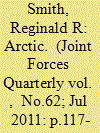

|
|
|
| 2 |
ID:
164074
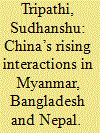

|
|
|
|
|
| Summary/Abstract |
In fact, both India and China continue to struggle for the supremacy of the geopolitically sound and strategically important Indian Ocean Rim region (IOR) with a view to surpass each other in this area of sea waters as a major bone of contention between the two hostile neighbour though the thorniest border issue still remains unresolved between them. While Beijing ridicules Indian position with respect to Indian Ocean just not as India’s Ocean, China must also not extend its claim over the entire South China Sea as China’s own Sea and ought to honour this principle of equity as regards its expanding roles in Nepal, Bangladesh and Myanmar besides many other countries scattered around the Indian Ocean Rim.
|
|
|
|
|
|
|
|
|
|
|
|
|
|
|
|
| 3 |
ID:
115281
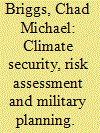

|
|
|
|
|
| Publication |
2012.
|
| Summary/Abstract |
Climate and environmental changes pose emerging and unique challenges to international security-as the global community experiences issues of food insecurity, severe droughts and floods-and have cascading impacts on energy supplies and infrastructure. Environmental hazards may shift abruptly, posing new risks to vulnerable systems and critical nodes in ways that diverge from historical experience. Effective risk assessments and planning will require understanding of how climate change will affect natural disasters and disaster response, and how hazards may be more extreme or unique from past experiences. This article discusses the role of climate change in affecting security planning from a military perspective, and how integration of scientific data and intelligence methods can foster assessment and effective response.
|
|
|
|
|
|
|
|
|
|
|
|
|
|
|
|
| 4 |
ID:
134044
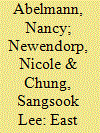

|
|
|
|
|
| Publication |
2014.
|
| Summary/Abstract |
In this article, the authors compare two prominent examples of the East Asian middle-class transnational split family (TSF) form of international migration in which typically the mother accompanies children abroad while the father stays home to economically support the family: the "astronaut families" (taikong) in Hong Kong in the 1990s, and the "geese families" (kir?gi kajok) in South Korea in the 2000s. Many scholars have located the origin of this migration form in shared East Asian cultural values of familism; moreover, what appears to unite these East Asian TSFs is their shared instrumentalism. The authors argue, however, that the construct of cosmopolitanism-in which citizens share a deep-seated interest in membership in the global community of developed, liberal nations-allows for the appreciation of the distinctive characteristics of TSF migration in Hong Kong and South Korea. The authors analyze Hong Kong and South Korea's respective popular media representations of the rise and wane of the TSF migration pattern in order to elaborate on their particular cosmopolitanisms. During the rise period, Hong Kong's migration was a strategy to secure the region's foundational cosmopolitan identity, while South Korea's was motivated by the search for a newfound cosmopolitanism. In the wane period, the authors suggest that Hong Kong and South Korean cosmopolitanisms are converging. First, in both locations people have begun to question how effective sojourn abroad is for either acquiring or securing cosmopolitanism. Second, in both areas people have begun to recognize the possibility of living cosmopolitan lives at home.
|
|
|
|
|
|
|
|
|
|
|
|
|
|
|
|
| 5 |
ID:
151779
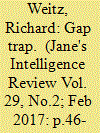

|
|
|
| 6 |
ID:
127523
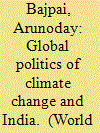

|
|
|
| 7 |
ID:
081990
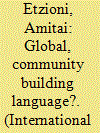

|
|
|
|
|
| Publication |
2008.
|
| Summary/Abstract |
Although long championed, a global language has not come to fruition despite considerable efforts. Many fear that such a language would undermine the particularistic, identity-constituting primary languages of local and national communities. These concerns can be addressed at least in part by utilizing a two-tiered approach in which efforts to protect primary languages are intensified at the same time that a global language is adopted as an additional language and not as a substitutive one. Although the U.N. or some other such global organization could, theoretically, choose a language to serve as the global language, English is already (and increasingly) occupying this position as a result of the colonial period and post-colonial developments. In this respect, English is compared to the development of the railroad system in the United States, which although introduced at considerable human costs by overpowering corporations, later became an integral part of the economy and society. Whether English should be adopted as a second language, or as a third or fourth one, is heavily influenced by the level of difficulty involved-the labor to fluency ratio-in acquiring a new language
|
|
|
|
|
|
|
|
|
|
|
|
|
|
|
|
| 8 |
ID:
137214
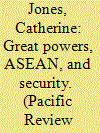

|
|
|
|
|
| Summary/Abstract |
The positive role that external powers can play in the creation and maintenance of security in regions has long been ignored; external interference is generally perceived as detrimental to the ability of a group of states to function as a community. However, this paper argues that in the case of ASEAN, the presence of external actors allows the group to function as a community that also provides and ensures security. This paper furthers the debate regarding ASEAN's security functions. With international attention focused on the Asia-Pacific, there is a need to understand the context in which security is maintained in Southeast Asia.
|
|
|
|
|
|
|
|
|
|
|
|
|
|
|
|
| 9 |
ID:
132544
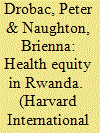

|
|
|
|
|
| Publication |
2014.
|
| Summary/Abstract |
This April, Rwanda will commemorate the 20th anniversary of one of the last century's greatest human tragedies, the 1994 genocide that took the lives of one million Tutsis and moderate Hutus in just one hundred days. As the global community turns its attention to Rwanda on this occasion, they will find a country radically different from the Rwanda of the past. The new Rwanda is a stable and increasingly prosperous country, one where life expectancy has doubled since the difficult aftermath of the genocide. The government's commitment to equity has catalyzed rapid and widespread development, largely by creating opportunity for its poorest citizens. Meanwhile, the health sector's pioneering efforts in health care delivery have drawn global attention. With strong leadership, smart partnerships and innovative programs, Rwanda is forging a new pathway for development.
|
|
|
|
|
|
|
|
|
|
|
|
|
|
|
|
| 10 |
ID:
094506
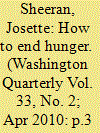

|
|
|
| 11 |
ID:
151186
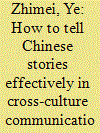

|
|
|
| 12 |
ID:
110275
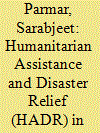

|
|
|
|
|
| Publication |
2012.
|
| Summary/Abstract |
Humanitarian Assistance and Disaster Relief (HADR) operations have attracted the attention of the global community in recent years. Building capabilities, interoperability and a conceptual framework for participation in these operations is gaining increasing urgency among Indian policymakers. The Indian armed forces have a wide experience of disaster relief operations both at home and abroad, where they have been the core of relief operations. Due to its sub-continental size, geographical location and its vulnerability to disasters, India has kept its forces ready to render assistance at short notice. In the six decades since independence, India has experienced a number of natural and man-made disasters such as floods, earthquakes, famines, industrial accidents etc. At the same time, India has partnered the global community in providing relief in affected regions. As India moves to occupy an important position in the global community, it is in the process of bolstering its capabilities to match the rising expectations. That India would play an important role
|
|
|
|
|
|
|
|
|
|
|
|
|
|
|
|
| 13 |
ID:
130671
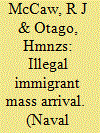

|
|
|
| 14 |
ID:
092408
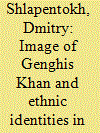

|
|
|
|
|
| Publication |
2009.
|
| Summary/Abstract |
The recent rise of Asia as a global geopolitical center has led to renewed interest in Asian history, not just by Asians but by Europeans as well. Genghis Khan is one of those figures who attracts attention, and several movies on him have recently been created. One of them was made in Russia and has led to broad public response. These responses have made it possible to gauge the views of the Russian public on the role of Russia in the global community and the relationship between Russians and ethnic minorities of the Russian Federation.
|
|
|
|
|
|
|
|
|
|
|
|
|
|
|
|
| 15 |
ID:
114363


|
|
|
| 16 |
ID:
130809
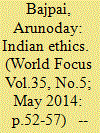

|
|
|
|
|
| Publication |
2014.
|
| Summary/Abstract |
The contemporary global community continues to be in throes of multiple problems accumulated in the course of growth and development of human civilization. The problems of violence within and among nations: rising terrorism and organized crimes in different parts of the globe; increasing poverty and hunger: threatening dimensions of food and energy crises and to cap it all pending catastrophe of climate change and other forms of environmental degradation. it is not that the global community- and nations collectively or individually are not aware of these challenges or they have failed to corrective actions. We are more aware of these problems than any time in the history of mankind. Also. we have put in place various strategies. policies and mechanisms to manage. and solve these challenges. Even global community has suddenly woken up to the call for switching over to the alternative vision of sustainable development. However. the alternative sustainable development strategy seems faltering amidst of unsustainable ideas and practices inspired by materialistic progress and over emphasis on sel?sh interests of nations and individuals alike. The moot question is how the prevailing development paradigms fashioned and refashioned to suits the needs of evolving globalized economy is capable of facing these challenges? What are its ethical foundations? What alternative ethical framework or vision we can evolve? And ?nally, how the Indian ethical framework is relevant for this alternative vision?
|
|
|
|
|
|
|
|
|
|
|
|
|
|
|
|
| 17 |
ID:
095140
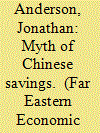

|
|
|
| 18 |
ID:
121553
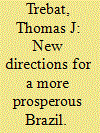

|
|
|
|
|
| Publication |
2013.
|
| Summary/Abstract |
This article examines whether increasing global confidence in Brazil is well founded and, if so, what the implications might be for the global community. Landmark political, economic, and social achievements in contemporary Brazil are reviewed as well as the obstacles to raise human welfare to developed country standards within the next decade. The paper concludes that Brazil's growing influence in the global community is based on sound empirical evidence, a diverse economy, and an emerging society; it is not the result of passing good fortune. At the same time, the crushing legacy of past problems in areas that are vital to human welfare, including the education system and deficiencies in innovation and technological advance, continues to weigh heavily. Depending on how well its leadership deals with the legacy of the past, Brazil could become a more important actor in the international community over the next ten years. Brazil's rising use of "soft power" will contribute to addressing global issues such as clean forms of energy, sustainability, food security, and social inclusion. Even for this possibility alone, Brazil merits much close attention from a global community not yet fully aware of Brazil's transformation.
|
|
|
|
|
|
|
|
|
|
|
|
|
|
|
|
| 19 |
ID:
114945


|
|
|
| 20 |
ID:
087328
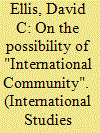

|
|
|
|
|
| Publication |
2009.
|
| Summary/Abstract |
The term "international community" has recently become commonplace in leaders' and academics' discourse and the subject of some analysis. While scholars have begun to explore its usage, there has not yet been a modern theoretical evaluation of the prerequisites for creating an international community. This article conducts a theoretical analysis on the types of international communities that can be generated in international politics and the structural factors necessary for their manifestation. It continues by investigating the possibility of forming a unitary actor, called the "International Community," tasked with resolving global commons issues through an international organization, such as the United Nations. The article concludes by arguing that the conditions do not yet exist for a meaningful "International Community."
|
|
|
|
|
|
|
|
|
|
|
|
|
|
|
|
|
|
|
|
|